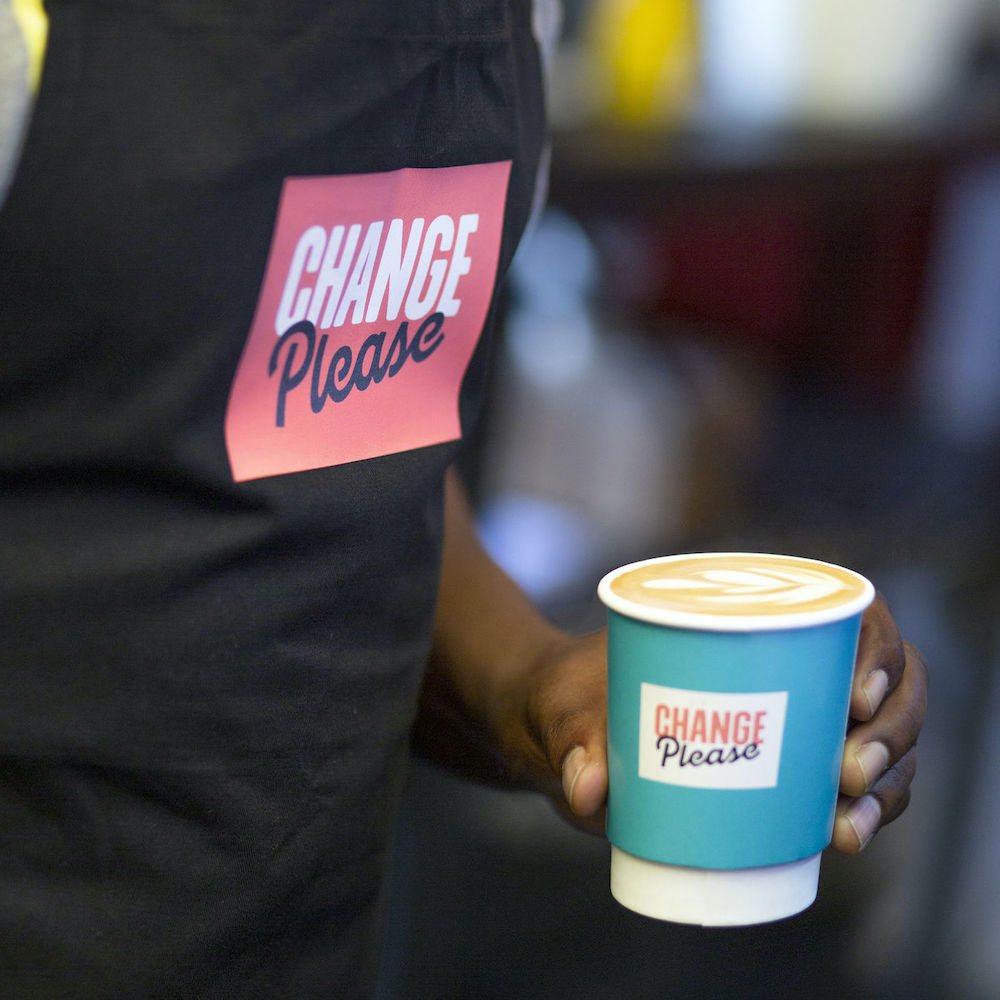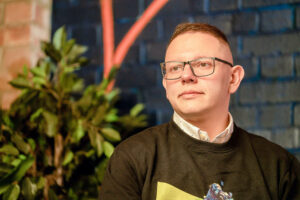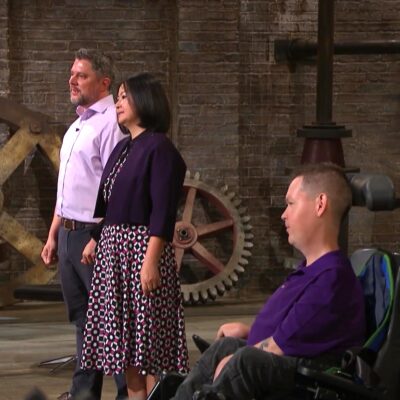
Read our 2022/23 Impact Report
In our Impact report we share that we proudly hosted 73 mentoring sessions for social enterprises and charities in the past year.

Perhaps the most exciting aspect of the news that social enterprise Change Please had bought coffee chain AMT – a familiar sight at train stations, airports and other places with heavy foot traffic – was the prospect of thousands of people being exposed to a social enterprise and potentially understanding what that meant for the first time.
In the reports we’d read it wasn’t clear whether those 55 AMT sites would be rebranded in the Change Please colours but Cemal is happy to confirm that they will be. The first to be ready will be Cork airport and London Euston station and he’s as excited about that visibility as we are.
“My biggest focus personally is to try and show a way we can do business for good, that there’s a way to still have a triple bottom line, but also support people at the same time. For me, to represent what is possible in business is the most exciting part,” said Cemal.

Change Please trains formerly homeless people as baristas whilst also providing wraparound support with housing, finances and therapy. Since Cemal Ezel started the business in 2015 it has become one of the poster people for social enterprise in the UK, not only because of high profile media appearances on mainstream news channels and Jamie Oliver’s programme, but also because of the growth it has experienced, winning contracts to supply coffee on Virgin planes and trains, and expanding to the US and France.
The AMT deal happened so quickly that new company CP Retail had to be established because a CIC “takes up to six weeks,” he tells us. CP Retail is 100% owned by Change Please CIC. All current AMT staff will be employed by CP Retail and will be getting (on average) a £4K annual pay rise, as Change Please pays the Living Wage.
When Change Please launched in London in 2015, the city’s millions of commuters would always have one of three things in their hand rushing to and from the office: their phone, a newspaper and a takeaway cup of coffee from one of the three industry big brands. The feelgood factor of helping the homeless seemed like a winning USP and it didn’t seem a big leap to one day imagine as many Change Please sites as Starbucks, Caffe Nero or Costa have.
He thinks the business models of those three are “obviously great”, and knows that kind of scale of business could mean serious impact for their cause should Change Please achieve it, but he’s wary of the negatives that come with that (“losing your personality and your soul”) and thinks the influence of Change Please could be transformative even at their comparably modest size.
“When I speak about the large brands, my mission is really: how do we put pressure on them to do more good rather than just be them? If Starbucks paid a living wage, if they just changed their cups to be biodegradable, compostable, you know, all of these elements. Having that decision would make the world – overnight – a better place,” said Cemal.
“Putting pressure on them through us, essentially still an early stage business startup, telling them that it’s possible to do things differently … I think we will have a much bigger impact than trying to get to 3,000 sites in the short term. That’s my philosophy on it.”
Starbucks has pledged to “double the recycled content, recyclability and compostability, and reusability of our cups and packaging by 2022.” The company is not currently listed as paying the Living Wage.
Pinpointing profits
The pandemic has likely changed commuting forever and, with Change Please also taking on £5m of AMT’s debt, what kind of profits can the company expect to make with this acquisition?
Cemal concedes that footfall at train station sites and passenger numbers are down compared to 2019, but says that hospital sales (where other AMT sites are) are up by about 110% “so it balances out”. The debt has been re-structured with the landlords of the sites so there is more time to pay it off. Therefore profits are forecast for year three or four.
“So, yeah, it means that we won’t necessarily be generating profits to then grow. But frankly, I’m not expecting to want to open another 30 sites overnight in the next couple of years. This period that we’re going into now is about stability,” says Cemal.
But hang on. If 100% of Change Please profits go to supporting people experiencing homelessness and there are no profits for a few years, what does that mean for helping homeless people?
“In generating our income we make impact. If we make profits that’s a bonus, which will be reinvested to grow quicker. But by providing people who are homeless with jobs, housing and other support as well … as long as we are breaking even we are fine.
“We call it upstream and downstream. So the upstream is the process of generating your income. When you get to a profit-making position that’s the downstream part – where you reinvest that profit back into your circle. At the upstream stage we generate impact and in the downstream stage we then reinvest to have impact quicker. We don’t need to generate profit to have impact. We just need the profit to grow and have a bigger impact,” said Cemal.
Helping the homeless
What also attracted Cemal to the AMT sites was they were the kind of locations – train stations, hospitals – where homeless people gravitate towards. As he describes it, Change Please will now have more of an opportunity to form part of the safety net for homeless people.
“All around Network Rail sites there are people that sit outside that are homeless, there are outreach teams, they speak to Streetlink. So we would be working with those landlords to say, rather than you trying to kick those people off or call the police, why don’t we work with you to get those people trained within the Change Please system?”
In their six years of operation, Change Please has supported 480 people out of homelessness, something Cemal puts in context as around 6% of all the rough sleepers in the UK. For comparison he says the money Change Please has spent would have been enough to provide all rough sleepers in the country with a sleeping bag, but is keen to be explicit about how their support works.
“We really believe in a full life intervention. We provide the training. We then provide living wage employment, housing, bank accounts, mental health therapy support to help with their counselling. We’ve got clinical psychologists, and a whole range of other kinds of in-house and partner services, which are really tackling the root cause of why that person might be depressed or have mental health issues, or a difficult life which has led them to be homeless.
“If we’re not providing that counselling or therapy support, then we have noticed that that person, no matter how much you pay them in a job or how quickly you provide them with housing, goes back into a cycle of homelessness after around three months,” said Cemal, becoming very animated as he explains this.
Both Cemal and Change Please have had a tough time during the pandemic. He got Covid-19 and his 72 staff went down to 12 at one point, although the AMT acquisition will mean he can hire back some of the staff he had to let go.
He’s fitted our half hour discussion in as he’s driving between appointments and after we’ve said our goodbyes, my phone pings; Cemal has sent design plans for a kiosk that will sit at one of London’s main train stations. Despite the challenges of the last 18 months, it’s evidence of how passionate he continues to be about continuing to tackle homelessness, and trying to show there is a better way to do business.
Cemal Ezel used our mentoring service to meet Karen Lynch. Need a mentor? Find out more here.

Read our 2022/23 Impact Report
In our Impact report we share that we proudly hosted 73 mentoring sessions for social enterprises and charities in the past year.

Social entrepreneurs partner to help homeless and refugees
Proving you’re never too young to be a social entrepreneur is 17 year old Jacob Bell, whose candle making has led to a partnership with one of the poster boys of social enterprise.

How does it feel to appear on Dragons’ Den?
Rene Perkins of CityMaaS, who appeared on the show during the most recent run, reveals the truth about appearing on the perennial television favourite.